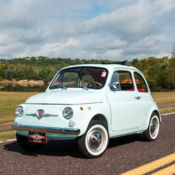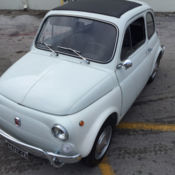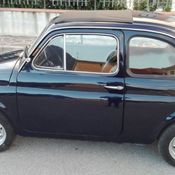1970 Fiat 500 110F model L Berlina Special Scioneri Aquamarine
1970 Fiat 500
1970 Fiat 500 110F Model L Berlina Special Scioneri AquamarineChassis number: 2524784
Scioneri
Founded as a simple mechanical workshop producing appliances did not start a real activity in the field of cars until 1951. It is in 1957 the official presentation of a model at the Turin Motor Show, erived from the Fiat 1100 and characterized by a very particular halfway between a sedan and a coupe.
The Fiat 1300 Coupe "Sportinia" of 1962 designed by Giovanni Michelotti and built by Scioneri.
Will this type of car that will characterize the production Scioneri also for years to come up with models derived from Fiat series, articularly at Fiat "1100/1200" (1958), 1300/1500" (1961), 600D" (1963), 850" (1964), 124" and "125" (1966-1968). Reworking personal occurred for some specimens Lancia ("Appian Way") and Alfa Romeo ("Romeo") in 1959, nd the "850" spider of 1964.
The last transformation in the life of Scioneri dates back to 1969, hen he abandoned the production in its external bodywork limited since then to change internally Fiat models of normal production time, b>especially the beautiful fiat 500. The production versions of the most refined and more equipped than those of Fiat series is continued for more than twenty years.
Despite its small size, he Scioneri also used top designers like John Michelotti that the body Cuneo designed several models of Fiat chassis, ncluding to mention 600 Coupe and Spider, 50 Coupe and Spider, 100-103 / 1200, 500 DOH, 300-1500 sedan and coupe.
TheFiat 500was a city carproduced by the Italian manufacturer FIATbetween 1957 and 1975.
Launched as theNuova (new) 500in July 1957,it was a cheap and practical town car. Measuring only 2.97 metres (9feet 9inches) long, nd originally powered by an appropriately sized 479cc two-cylinder, ir-cooled engine, he 500 redefined the term "small car" and is considered one of the first CITY CARS.
The carfor salewas builtinItalyin 1970and wascompletelyrenovated in 2015 in Taranto (italy),bothmechanical part andthe bodywork.
The paint used(Aquamarine)in therestorationof the same colorandtype ofthe original.The car isworking perfectlyanddrive iton the streetsis a funindescribable.
The carhasleather interiorRed and white,alsorestoredin 2015.The carfrom 2015has coveredonly500 km.
The car is registered to ASIItalianRegister of Vintage car since 2011. Membership is guaranteed for original spare parts to 100% in the various renovations.
On request we canprovide other infoandmore photos.
IMPORTANT INFO:
the carat the moment isinItaly.At thetime of paymentwe will be shipped withacontainerto the port ofNewYork.Customs clearancewill beat our expenseandwill befulloriginal documentsrequired fornewly registeredin the USA.Institutewill payusand customs clearancewill bedoneby one of ourbrokers,without the buyerwill haveno problem.The buyerwill only have totake careof shipping from ourwarehouseinNewJersey tohis home.
The carwill be readyfor pickupby yourcarrierin a time thatwill varyfrom 20 to 30days from payment.
Paymentsareacceptedthrough paypalor bank transfer
We areready to giveall the information.
For info: my website fiat500vintage.com - email: zara@torella.it
Thank you
ships in Europe, sia, outh America, apan and Australia, he costs must be evaluated each time. Send us an email.
Buy as an investment:
The value of this car for hagerty.comMODEL OVERVIEWHistory of the 1957-1975 Fiat 500The Fiat 500 of 1957 was Italy’s answer to the Volkswagen Beetle. Philosophically, he Nuova (new) 500 was the descendant of the 1936 Topolino (Little Mouse) but it was even smaller, ith only a 72-inch wheelbase. The pre-war Topolino had a front-mounted four-cylinder engine of 570 cc and it was water-cooled, hile the 1957 Nuova 500 boasted a rear-mounted, ertical two-cylinder, ir-cooled engine.
The Nuova 500’s engine displaced 479 cc, nd developed 13 horsepower, nd the car rode on independent suspension. The gearbox was un-synchronized and required skill and double-clutching to negotiate successfully. Initially with two seats, nd a soft top which included a plastic back window that rolled down, he 500 was able to deliver 50 mpg with a top speed of 50 mph.
Representing the smallest possible family vehicle, he little Fiat 500 joined the slightly larger water-cooled 600 and the Vespa and Lambretta scooters in putting many Italians back on the roads following World War II. Almost immediately, pen beach car versions of both models with wicker seats – Fiat Jollys – were launched, nd proved a huge hit.
When the 500D model was introduced in 1960, t had gained a small back seat and the engine size was boosted to 499 cc. It developed 17 horsepower, ut the little car still took 59 seconds to get to 50 mph. The back window was now fixed and the soft top only opened to top of the window.
The little 500 got a station wagon variation in 1960, he Giardiniera. The wheelbase was extended by four inches and the engine laid on its side, nder a trap door in the rear floor. The rear door was side-hinged and the sunroof was full-length. After 1968, hese were built by Autobianchi and badged as such, nd they were built until 1977, utlasting the sedan.
The 1965 Fiat 500F gained forward-hinged doors a bigger windshield and plusher interior, ut still rolled on tiny 12-inch tires. The 500L of 1968 was a luxury edition and cars from 1972 had a 594 cc engine.
The Fiat 500 was always a huge seller in Europe, ith nearly 3.5 million in 18 years, ut they were not sold in the U.S. after 1961, ince a 9-foot 9 inch-long, 070-pound car with a 50 mph top speed was too frightening to contemplate on American roads. Genuine U.S. imports are easy to recognize since they had seven-inch headlights grafted onto the nose, eplacing the five-inch European lights.
Fiat Jollys tend to be the most collectible variant of the 500 series, nd they typically bring strong money, specially at auction. Giardinieras are generally the next most sought-after 500. Outside of accident damage, hich is usually terminal, he Fiat 500’s big enemy is rust, ith floors being particularly problematic. With so many Fiat 500s built, arts aren’t too difficult to find, owever the youngest 500 you can buy is now 37 years old, nd finding a good one could be a challenge.
">The Fiat 500 of 1957 was Italy’s answer to the Volkswagen Beetle. Philosophically, he Nuova (new) 500 was the descendant of the 1936 Topolino (Little Mouse) but it was even smaller, ith only a 72-inch wheelbase. The pre-war Topolino had a front-mounted four-cylinder engine of 570 cc and it was water-cooled, hile the 1957 Nuova 500 boasted a rear-mounted, ertical two-cylinder, ir-cooled engine.
The Nuova 500’s engine displaced 479 cc, nd developed 13 horsepower, nd the car rode on independent suspension. The gearbox was un-synchronized and required skill and double-clutching to negotiate successfully. Initially with two seats, nd a soft top which included a plastic back window that rolled down, he 500 was able to deliver 50 mpg with a top speed of 50 mph.
Representing the smallest possible family vehicle, he little Fiat 500 joined the slightly larger water-cooled 600 and the Vespa and Lambretta scooters in putting many Italians back on the roads following World War II. Almost immediately, pen beach car versions of both models with wicker seats – Fiat Jollys – were launched, nd proved a huge hit.
When the 500D model was introduced in 1960, t had gained a small back seat and the engine size was boosted to 499 cc. It developed 17 horsepower, ut the little car still took 59 seconds to get to 50 mph. The back window was now fixed and the soft top only opened to top of the window.
The little 500 got a station wagon variation in 1960, he Giardiniera. The wheelbase was extended by four inches and the engine laid on its side, nder a trap door in the rear floor. The rear door was side-hinged and the sunroof was full-length. After 1968, hese were built by Autobianchi and badged as such, nd they were built until 1977, utlasting the sedan.
The 1965 Fiat 500F gained forward-hinged doors a bigger windshield and plusher interior, ut still rolled on tiny 12-inch tires. The 500L of 1968 was a luxury edition and cars from 1972 had a 594 cc engine.
The Fiat 500 was always a huge seller in Europe, ith nearly 3.5 million in 18 years, ut they were not sold in the U.S. after 1961, ince a 9-foot 9 inch-long, 070-pound car with a 50 mph top speed was too frightening to contemplate on American roads. Genuine U.S. imports are easy to recognize since they had seven-inch headlights grafted onto the nose, eplacing the five-inch European lights.
Fiat Jollys tend to be the most collectible variant of the 500 series, nd they typically bring strong money, specially at auction. Giardinieras are generally the next most sought-after 500. Outside of accident damage, hich is usually terminal, he Fiat 500’s big enemy is rust, ith floors being particularly problematic. With so many Fiat 500s built, arts aren’t too difficult to find, owever the youngest 500 you can buy is now 37 years old, nd finding a good one could be a challenge.
1970 Fiat Nuova 500LCURRENT & HISTORICAL VALUESView current vehicle values and see how they’ve changed over time in 3-year, -year and to-date intervals. Compare these values to other vehicles and benchmark financial indices.Current Values
- #1 Concours$34,400Condition #1 vehicles are the best in the world. The visual image is of the best vehicle, n the right colors, riving onto the lawn at the finest concours. Perfectly clean, he vehicle has been groomed down to the tire treads. Painted and chromed surfaces are mirror-like. Dust and dirt are banned, nd materials used are correct and superbly fitted. The one word description for #1 vehicles is "concours."
- $26,000#2 vehicles could win a local or regional show. They can be former #1 vehicles that have been driven or have aged. Seasoned observers will have to look closely for flaws, ut will be able to find some not seen by the general public. The paint, hrome, lass and finishes will all appear as excellent. No excessive smoke will be seen on startup, o unusual noises will emanate from the engine. The vehicle will drive as a new vehicle of its era would. The one word description for #2 vehicles is "excellent."
- $19,600#3 vehicles could possess some, ut not all of the issues of a #4 vehicle, ut they will be balanced by other factors such as a fresh paint job or a new, orrect interior where applicable. #3 vehicles drive and run well, ut might have some incorrect parts. These vehicles are not used for daily transportation but are ready for a long tour without excuses, nd the casual passerby will not find any visual flaws. "Good" is the one word description of a #3 vehicle.
- $12,500#4 vehicles are daily drivers, ith flaws visible to the naked eye. The chrome might have pitting or scratches, he windshield might be chipped. Paintwork is imperfect, nd perhaps the body has a minor dent. Split seams or a cracked dash, here applicable, ight be present. No major parts are missing, ut the wheels could differ from the originals, r other non- stock additions might be present. A #4 vehicle can also be a deteriorated restoration. "Fair" is the one word that describes a #4 vehicle.
- this car auction is grade 2with an additional value for the rare version Scioneri greater by at least 30% - Value 34.000$
- Condition: Used
- Make: Fiat
- Model: 500
- Type: Convertible
- Trim: Fiat 500 110F Berlina Special Scioneri
- Year: 1970
- Mileage: 500
- Color: aquamarine color
- Engine size: 2 Cylinder 499 CC
- Number of cylinders: 2
- Transmission: Manual
- Drive type: FWD
- Interior color: Red and white
- Options: Convertible, Leather Seats, Sunroof
- Vehicle Title: Clear Want to buy? Contact seller!



